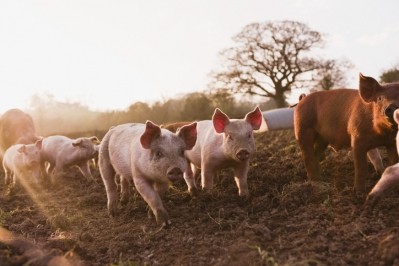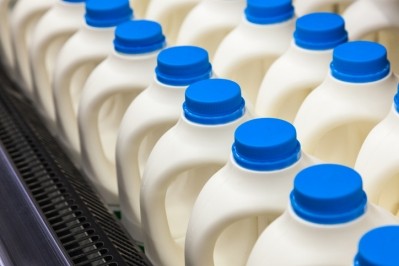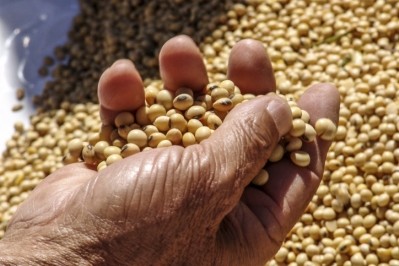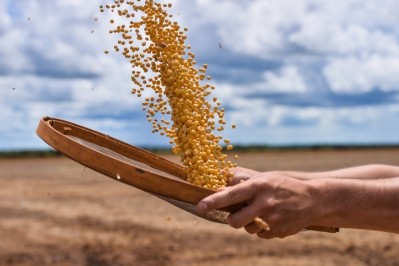‘Collaboration across the supply chain is key to address the environmental impacts of feed’
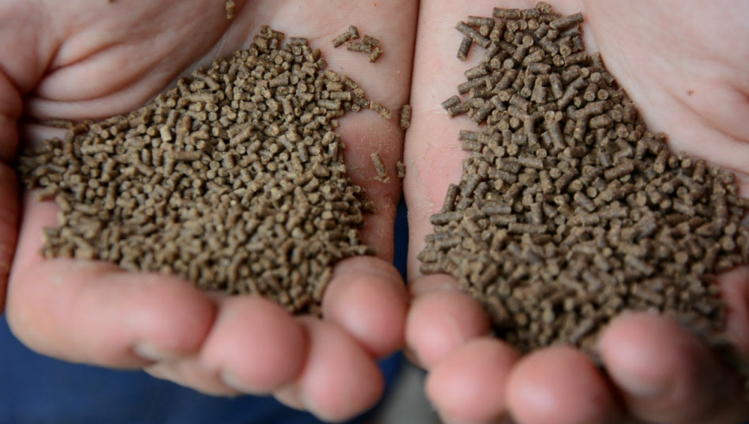
That interactive session takes place at the end of the second day of Feed Protein Vision in Amsterdam in March; the workshop aims to join up the supply chain on animal feed protein innovation.
Collaboration across the supply chain is critical to address the environmental impacts of feed, said Simon Billing, the Protein Challenge 2040 lead at Forum for the Future.
“We should get some great perspectives from these leading players.
“We want to have a conversation around sustainable feed [at the workshop] and what that might look like in the future,” he told us.
Sustainable Protein
The Protein Challenge 2040 has just released a report, The Feed Behind Our Food, which Billing says is “the first step” in helping retail and food service professionals start to build knowledge of their feed security, and join forces with their suppliers, including producers and feed companies to formulate strategies together to speed up progress on sustainable feed.
That publication forms part of Feed Compass, a Protein Challenge 2040 coalition project aimed at scaling up solutions for more sustainable animal feed. Led by a group of international retailers, food manufacturers, feed ingredient suppliers, innovators and NGOs, Billing said Feed Compass is developing an easy-to-use tool that will help the food industry compare different types of feed and guide purchasing decisions.
The tool will be robust in terms of the science behind it: “The Feed Compass group has just appointed a team from University of Minnesota’s Institute on the Environment to bring rigor to the design, criteria, and development of the tool with practitioners."
He called for more retailers, food service companies, animal protein producers and feed companies to join the Feed Compass group to help drive it.
Land use
“We can’t increase agriculture expansion without massive impact on land use change. The spotlight is coming on quite strong onto animal protein, most recently at the World Economic Forum annual meeting in Davos, and the initiative launched there - Meat: the Future
“There is no silver bullet in the solution. We think there needs to be a common vision and viewpoint across the supply chain, about what should make up the future balance and portfolio [of feedstuffs]. That is what we are trying to do through Feed Compass, find a simpler way to assess what might be a stronger sustainability fit from a range of factors.
"The call for action [for stakeholders] in the report is ‘get into the conversation, across the supply chain, and collaborate; understand where the impacts are in feed and in animal protein.
"We are asking retailers and food service companies, who are closest to consumers, to take more of a lead but to do that in collaboration with the supply chain.”
Register now for Feed Protein Vision.
Many food chain stakeholders are already involved in global initiatives to reduce environmental impacts of feed cultivation. UK-based supermarket chain, Waitrose, is working towards using 100% sustainable soy and sourcing more feed raw materials from the UK and Europe.
“Addressing the sustainability of animal feed by bringing it closer to home through our sustainable forage protein project has not only benefited the environment but has helped our farmers improve efficiency,” said Duncan Sinclair, agriculture manager, Waitrose.
Billing said, critically, there are lots of interesting technologies and alternatives that would take the pressure off agriculture expansion and marine resources, that are coming to market, that are attracting a lot of investment, but are not at scale or not at the right price.
Such innovation includes insect-based protein, oil from natural marine algae, and protein derived from methane-eating bacteria.
“We think the whole supply chain needs to be trialing, backing and providing a conducive environment to scale the most promising ones.”
Nothing of human value should be fed to animals according to the future vision of feed under the Protein Challenge 2040.
“I am not suggesting transition overnight. There are inequalities globally around food. The challenge that lies ahead is how to feed 10 billion people globally by 2050. We need to be thinking about what [feedstuffs] we back for the future. There are huge opportunities around co-products, huge opportunities in increasing efficiency of protein uptake, and in using amino acids. There are going to be a range of options, but I think we should be cautious about investing in options for feed that can be good human nutrition options.”
Communicating with consumers
The messaging to consumers is important.
“As consumer awareness is rising around animal protein and there is a bigger discussion around plant-based eating, then retailers defining what they see as more sustainable protein is going to be quite critical. Clearly, there are health benefits from consuming animal protein, but [the need for animal protein] produced at the minimal environmental cost is going to be more critical for the consumer into the future.”
Retailers are thinking quite hard about soy - the Cerrado Manifesto is a good example of retail lead in this space, he continued.
“There are quite high expectations on retailers to lead on these complex sustainability issues. However, transition takes years of investment and research. We need to take the long-term view on this. Retailers are starting to look at what sustainable protein means. I think you will start to see that emerging as part of corporate strategy from beyond 2020.
“NGOs will begin to step up a lot more on this agenda over the next year. WWF is taking a very strong stance now on biodiversity loss and food is a major driver of that.
“This is not going to let up. So let’s get into the discussion. Not all the solutions are going to be good or viable and there are going to be trade-offs. Let’s examine those.”
Billing said there is a need to build demand for sustainable animal feed, to value animal protein, and to rethink how it is positioned with consumers. “I don’t think the cost pressure on animal protein is good - we are dealing with live animals and raw materials. We are not saying the world should be vegan or vegetarian, we are saying it is about achieving a balance. People need to love and respect animal protein. If you can get the value behind it, then you can do so much more in terms of the sustainably side. Consumers are cut off from the reality of animal protein, and that is something the industry needs to do, collectively, to get people back in touch with the value of what is behind it.”
Register now for Feed Protein Vision.
